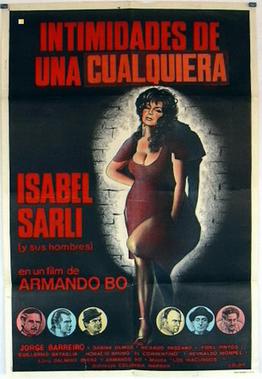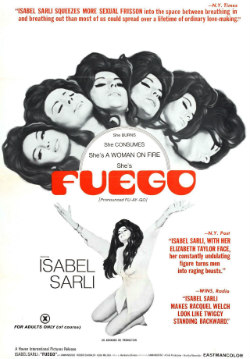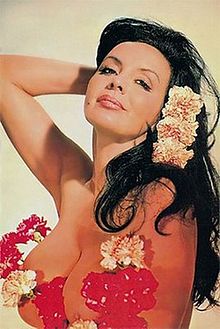
A sexploitation film is a class of independently produced, low-budget feature film that is generally associated with the 1960s and early 1970s, and that serves largely as a vehicle for the exhibition of non-explicit sexual situations and gratuitous nudity. The genre is a subgenre of exploitation films. The term "sexploitation" has been used since the 1940s.

Armando Bó was an Argentine film actor, director, producer, screenwriter and score composer. He began his career as an actor and producer during the Golden Age of Argentine cinema of the 1930s and 1940s. In 1956, Bó met Isabel Sarli and cast her as the lead actress in his film Thunder Among the Leaves (1957), in which she made the first full frontal nude in the history of Argentine cinema. Bó and Sarli became both romantic and commercial partners, and the duo turned to the sexploitation genre in the 1960s and 1970s, these films being considered emblematic of the genre.

Víctor Bó is an Argentine retired actor and film producer. He is the son of classic actor and director Armando Bó, who directed Bó Junior in several films in which he co-starred with his father's muse, Isabel Sarli. He is also the father and uncle of filmmakers and Academy Award Winners for Best Original Screenplay Armando Bo and Nicolás Giacobone, respectively.
La Burrerita de Ypacaraí is a 1962 Argentine film. The film contains music and an appearance from Paraguayan singer Luis Alberto del Paraná. Also was the first Argentinian film to be dubbed in French.
La Diosa impura is a 1963 Argentine-Mexican film, directed by Armando Bó and directed by Carmelo Santiago.

Furia infernal, known in English-speaking territories as Ardent Summer, The Hot Days or, in the Carne Sobre Carne: Intimidades de Isabel Sarli documentary rendering, The Horny Days, is a 1973 Argentine drama film directed by Armando Bó and starring Isabel Sarli.

Intimacies of a Prostitute is a 1974 Argentine sexploitation drama film directed by Armando Bó and starring Isabel Sarli, Jorge Barreiro, and Sabina Olmos. Various dates of the release have been given, some as early as 1971 or 1972.

Libertad María de los Ángeles Vichich Blanco was an Argentine film actress, famous for starring in several erotic films during the 1960s.
Una Viuda descocada is a 1980 Argentine comedy film written and directed by Armando Bó and starring Isabel Sarli. It is a sequel to the Bó's 1967 film La señora del intendente and it was also the last film he directed before his death.

Fuego is a 1969 Argentine sexploitation film written, produced and directed by Armando Bó and starring Isabel Sarli. It is one of the many erotic films that the couple made between 1959 and 1980.
Jorge Polaco was an Argentine film director and screenwriter. His 1987 film En el nombre del hijo won Best Film at the 1988 Festroia International Film Festival in Setúbal, Portugal.

Thunder Among the Leaves is a 1958 Argentine-Paraguayan drama film directed by Armando Bó, starring himself, Isabel Sarli, Ernesto Báez and Andrés Laszlo. The screenplay by Paraguayan writer Augusto Roa Bastos was based on his short story La hija del ministro. Set in Paraguay, the story is about a strike at a sawmill.

Palmera is a 2013 Argentine independent film directed by Leo Damario and starring Micaela Breque, Ceci Barros, Macarena Del Corro, Alina Jaume, Geraldine Guillermo and Érica García. The plot revolves around a group of six girlfriends who go to a large house in Tigre experimenting with psychoactive drugs, until one of them has a stroke.

La señora del intendente is a 1967 Argentine comedy film directed by Armando Bó and starring Isabel Sarli and Pepe Arias. The film had a sequel "Una Viuda descocada" (1980), which was Bó's last film.

María Miterloi Hernández, better known by her stage name Maruja Montes, was a Brazilian-born Argentine actress and vedette who performed during the middle part of the 20th century.

Carne is a 1968 Argentine sexploitation film written and directed by Armando Bó. It stars Isabel Sarli as Delicia, a worker in a meat-packing factory where she becomes the victim of rapists.

Eloisa D'Herbil was a Spanish pianist and composer. A child prodigy on the piano, by age seven, she had played before the heads of state in England and Spain. As a child, the press dubbed her "Chopin in skirts" and from a young age, she began composing musical pieces. Immigrating to Argentina in 1868, she continued to write music, becoming one of the first women to write tangos.
LGBT in Argentina refers to the diversity of practices, militancies and cultural assessments on sexual diversity that were historically deployed in the territory that is currently the Argentine Republic. It is particularly difficult to find information on the incidence of homosexuality in societies from Hispanic America as a result of the anti-homosexual taboo derived from Christian morality, so most of the historical sources of its existence are found in acts of repression and punishment. One of the main conflicts encountered by LGBT history researchers is the use of modern concepts that were non-existent to people from the past, such as "homosexual", "transgender" and "travesti", falling into an anachronism. Non-heterosexuality was historically characterized as a public enemy: when power was exercised by the Catholic Church, it was regarded as a sin; during the late 19th and early 20th centuries, when it was in the hands of positivist thought, it was viewed as a disease; and later, with the advent of civil society, it became a crime.

















